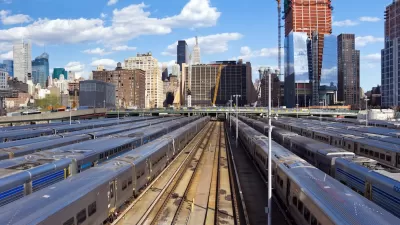Eminent domain is just one of the powers that would be granted the new Transit Corridor Development Authority, per House Bill 6851. The controversial bill is pitting the state's governor against opponents that argue in favor of local power.
Since March, the state of Connecticut has been debating a controversial House Bill 6851, also known as "An Act Establishing the Transit Corridor Development Authority." According to an op-ed by Matthew Gilligan in the CT Post, HB 6851 "would establish the Transit Corridor Development Authority (TCDA) as a quasi-public agency to focus on TOD projects around existing and future transit stations within the state."
"The TCDA would be charged with coordinating the development of state transportation initiatives, leveraging state and private investments in order to assist communities and stimulate economic growth and housing opportunities," adds Gilligan.
Gilligan writes as the president of the Connecticut Conference of Municipalities, voicing that organizations support for the bill. The Hartford Courant editorial board has also gone on record to support the bill.
An earlier news report by Bill Cummings and Alex Gecan detailed the political response to Connecticut Governor Daniel P. Malloy, who is supporting the bill. That article also provides this detail about the power of the bill: "The transit authority could use eminent domain to seize property within a half-mile of a train station, sell bonds to finance a project, enter into agreements for management and work to create new office and retail space, parking garages and cultural attractions."
Opposing opinions about the bill include that of Suzanne Bates and Zachary Janowski, who describe the bill as a land grab and an attack on the state's tradition of home rule:
"Draw a half-mile circle around the Metro-North rail stations in Fairfield County, Connecticut—sometimes called the 'Gold Coast,' and including towns like Greenwich, New Canaan, and Darien—and you quickly see why officials and residents demanded changes to Malloy’s bill. The land around these stations is some of the most valuable in the country; current development conforms to the quiet, quaint character that attracted many residents. These communities have used their local prerogative to remain suburban. Through the TCDA, Malloy could have changed that, imposing high-density development along the rail line."
Connecticut State Senator Toni Boucher (R-Wilton) also published a press release explaining her opposition to the bill.

Alabama: Trump Terminates Settlements for Black Communities Harmed By Raw Sewage
Trump deemed the landmark civil rights agreement “illegal DEI and environmental justice policy.”

Planetizen Federal Action Tracker
A weekly monitor of how Trump’s orders and actions are impacting planners and planning in America.

The 120 Year Old Tiny Home Villages That Sheltered San Francisco’s Earthquake Refugees
More than a century ago, San Francisco mobilized to house thousands of residents displaced by the 1906 earthquake. Could their strategy offer a model for the present?

Ken Jennings Launches Transit Web Series
The Jeopardy champ wants you to ride public transit.

BLM To Rescind Public Lands Rule
The change will downgrade conservation, once again putting federal land at risk for mining and other extractive uses.

Indy Neighborhood Group Builds Temporary Multi-Use Path
Community members, aided in part by funding from the city, repurposed a vehicle lane to create a protected bike and pedestrian path for the summer season.
Urban Design for Planners 1: Software Tools
This six-course series explores essential urban design concepts using open source software and equips planners with the tools they need to participate fully in the urban design process.
Planning for Universal Design
Learn the tools for implementing Universal Design in planning regulations.
Clanton & Associates, Inc.
Jessamine County Fiscal Court
Institute for Housing and Urban Development Studies (IHS)
City of Grandview
Harvard GSD Executive Education
Toledo-Lucas County Plan Commissions
Salt Lake City
NYU Wagner Graduate School of Public Service





























